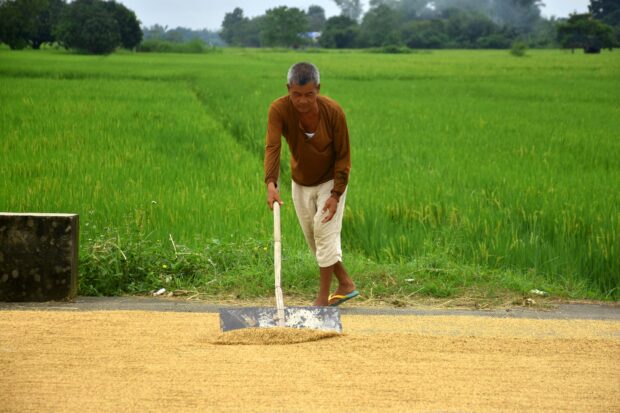
ROAD DRYING | A farmer takes advantage of the good weather to dry palay (unhusked rice) on a section of the Pangasinan-Tarlac Road in the village of Bocacliw in Aguilar, Pangasinan, in this photo taken in August 2022. (File photo by WILLIE LOMIBAO / Inquirer Northern Luzon)
MANILA, Philippines — The National Food Authority (NFA) has set a higher price range for its purchase of palay or unhusked rice from farmers to improve their income and ensure a sufficient supply of the staple.
According to Malacañang, the new buying prices per kilogram of P19 to P23 for dry palay and P16 to P19 for wet palay were determined on Monday by the NFA Council, chaired by President Ferdinand Marcos Jr. as agriculture secretary, who cited changing production and market conditions.
Noting the current palay production cost of P14 to P15 per kilogram, the President said that under the new price range, farmers would earn more.
“And aside from that, there is the price cap [for regular and well-milled rice] so that we can calm down what’s happening with the rice prices,” he added.
To arrest the skyrocketing price of rice, Mr. Marcos issued Executive Order No. 39 imposing a price ceiling per kilogram of P41 for regular milled rice and P45 for well-milled rice effective on Sept. 5.
Following the enactment of the Rice Tariffication Act in 2019, the NFA’s function was limited to ensuring a rice buffer stock for calamities and emergencies. The stock, ideally good for 90 days, must be sourced from local farmers.
Based on the NFA website, its buying price for palay is P19 per kilogram while its rice selling price ranges from P23 to P27 per kilogram.
Quoting the NFA, Malacañang said the original proposed palay buying prices of P20 and P25 were “just too high and [would lead to a] spike [in] retail prices.”
According to the agency, the newly decided price range “balances the profit of farmers and will not affect the retail prices as much.”
READ: NFA must maintain sufficient buffer stock – House official
Welcome move
Industry stakeholders welcomed the higher palay purchase price set by the NFA Council, saying it would help local farmers.
“Now, the ball is in the hands of the NFA to buy at the new price level, not only so that it can beef up its buffer stocks, but also to prevent palay prices from going down,” Federation of Free Farmers (FFF) national manager Raul Montemayor said.
If necessary, the government should augment the NFA’s budget allocation for purchasing palay and also help establish post-harvest facilities to absorb even freshly harvested unhusked rice from farmers, he added.
For Philippine Chamber of Agriculture and Food Inc. president Danilo Fausto, the development was “great news.” “It will somehow match the buying price of traders and/or rice millers,” he said.
Samahang Industriya ng Agrikultura (Sinag) thanked the government for hearing the pleas of palay farmers and urged the NFA to intervene now in areas where farm-gate prices have fallen below P20 per kilogram.
According to Sinag, it has been asking the NFA to procure palay since the first day of the “rice crisis,” which it blamed on the agency’s inability to buy even a single kilogram using its P8.5-billion budget for this year.
Last month, the group asked Marcos to abolish the NFA for its failure to support local farmers because of its alleged preference for rice imports. Sinag claimed that the agency had a buffer stock for only 1.56 days despite its mandate, resulting in panic buying of palay among farmers, millers, and traders.
Had the NFA used its 2023 budget properly, it could have secured 447,368.42 metric tons (MT) of palay, or about 290,798.47 MT of rice, equivalent to 5.8 million bags of rice, the group said.
According to the NFA’s accomplishment report, it had bought 7,673 bags of palay or 383.65 MT as of July, equivalent to 2.29 percent of the month’s target of 334,400 bags or 16,720 MT.
But the figure was lower than the 44,547 bags or 2,227 MT of palay it procured in July last year, with the agency attributing the decline to the onset of lean months.
READ: Speaker: Raising NFA’s buying price of palay will benefit farmers
Tariff cut studied
Discussions “at the highest level” in Malacañang, meanwhile, are ongoing regarding the proposed temporary reduction of import tariffs on milled rice even as farmers’ and agribusiness groups are calling for the removal of key economic managers from the Cabinet.
In a joint statement, Sinag, FFF, Kilusang Magbubukid ng Pilipinas, United Broiler Raisers Association, Pambansang Mannalon, Mag-uuma, Magbabaul, Magsasaka ng Pilipinas and other groups called for the removal of Finance Secretary Benjamin Diokno and National Economic and Development Authority Secretary Arsenio Balisacan.
“Importations, more so unlimited rice importation through tariff reduction, are not and will never be the wise choice especially since we have an agriculture sector that is still recovering, with the full support of the President,” the group stressed.
Diokno earlier said the finance department was in favor of a temporary cut in rice import tariff rates—to zero or a maximum of 10 percent—as part of a comprehensive strategy to arrest rising rice prices and prevent a possible shortage due to the El Niño phenomenon, which threatens agricultural output.
READ: Abolish NFA over rice debacle, Marcos urged